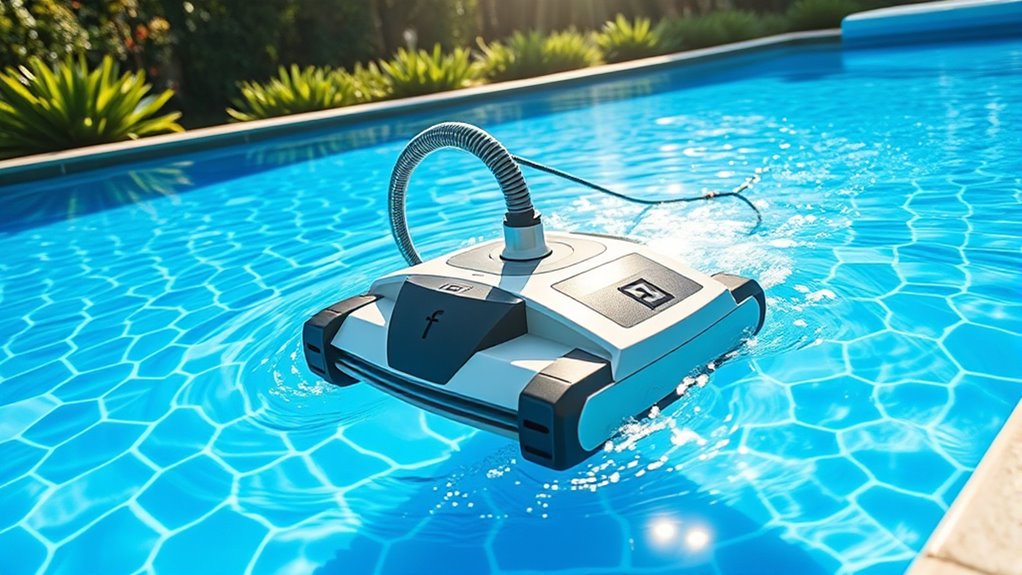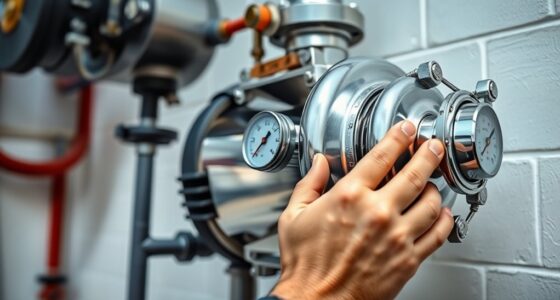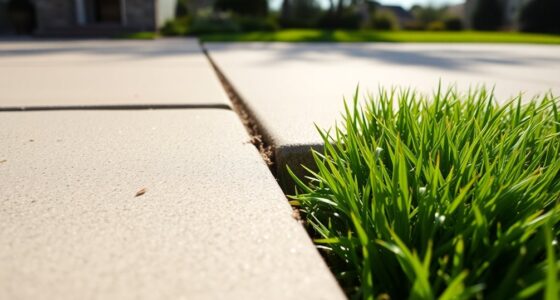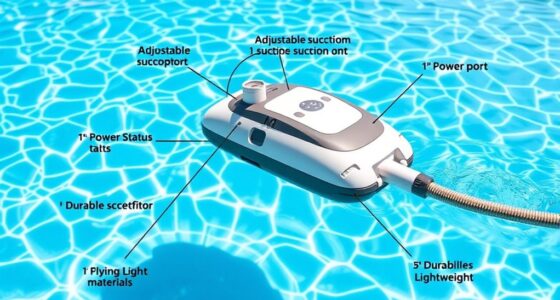How often you should run your suction pool cleaner depends on your pool’s usage, debris levels, and weather conditions. Generally, running it every 1-2 days is ideal if you have heavy debris or frequent use. For less busy pools or during good weather, weekly cleaning may suffice. Monitoring debris buildup and water quality helps you adjust the schedule. Keep your system maintained, and you’ll discover more tips to keep your pool spotless.
Key Takeaways
- Run the cleaner at least once a week for regular maintenance, increasing frequency during heavy debris or algae growth.
- Operate the cleaner more frequently (every 1-2 days) in high-use or debris-heavy pools, especially after storms.
- Adjust cleaning schedules based on debris accumulation, environmental conditions, and water chemistry balance.
- Use automatic scheduling features to ensure consistent cleaning without manual intervention.
- Regularly inspect and maintain the cleaner’s filters and brushes to optimize performance and extend lifespan.
Factors Influencing Cleaning Frequency
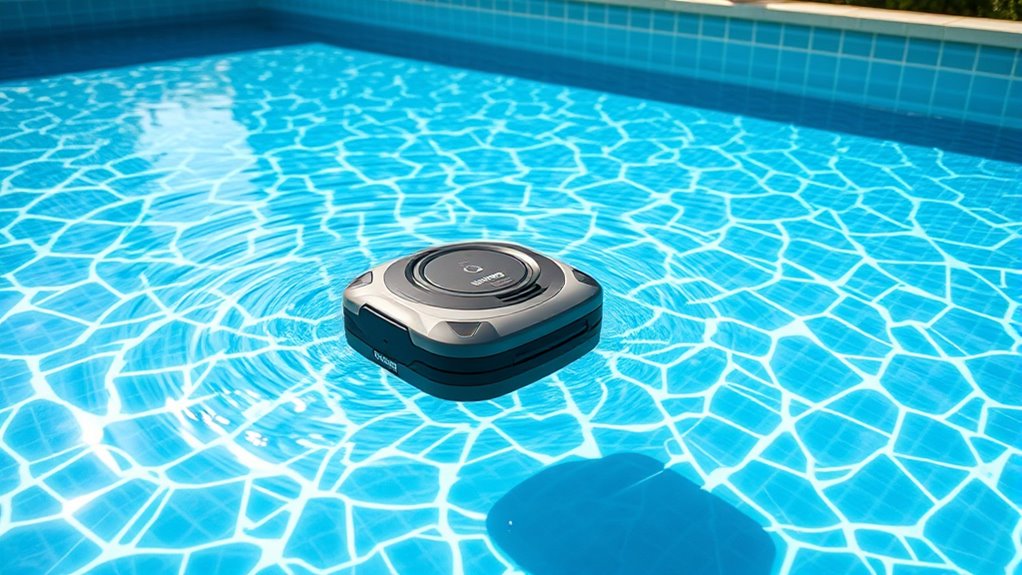
Several factors affect how often you should run your pool cleaner, and understanding these can help you maintain a clean, healthy pool. One key factor is the chemical balance; if your pool’s chemicals aren’t properly balanced, algae and bacteria can grow quickly, requiring more frequent cleaning. Additionally, equipment maintenance plays a crucial role—well-maintained filters and pumps ensure your cleaner works efficiently and lasts longer. If your pool sees heavy use or experiences frequent debris, you’ll need to run the cleaner more often. Conversely, in a less-used, well-maintained pool with stable chemical levels, less frequent runs may suffice. Monitoring these factors helps you determine the most effective cleaning schedule, keeping your pool pristine and safe for swimming. Incorporating space and organization strategies can also help keep equipment and surrounding areas tidy, reducing debris buildup and improving overall maintenance efficiency.
Daily vs. Weekly Cleaning Schedules

Choosing between daily and weekly cleaning depends on how often you use your pool and how well you want to maintain it. Regular cleaning helps keep your pool in top shape and reduces the need for major scrubbing later. Consider your routine to find the schedule that best balances convenience and maintenance. Additionally, understanding the debris type can help determine how frequently your suction pool cleaner should operate for optimal results. Incorporating automation in cleaning can further optimize maintenance schedules and reduce manual effort. For pools located in areas with high dust or pollen, adjusting the cleaning frequency based on environmental factors ensures better water quality and cleanliness. Regular use of a pool cover can also decrease debris buildup, reducing the frequency of cleaning needed.
Consistency and Maintenance
Maintaining a consistent cleaning schedule is essential to keep your pool in ideal condition, but deciding between daily and weekly routines depends on your usage and environment. Regularly check the chemical balance to prevent algae growth and ensure water clarity. Along with cleaning, perform equipment inspections to spot and address issues early, such as clogged filters or worn parts. Consistency helps you catch problems before they escalate, saving time and money. If your pool sees heavy use or has surrounding trees, a daily schedule may be necessary. For less frequent use, weekly maintenance can suffice, provided you stay attentive to water quality and equipment condition. Staying disciplined with your routine guarantees your pool remains clean, safe, and inviting year-round.
Pool Usage Frequency
The frequency with which you run your pool cleaner largely depends on how often the pool is used and the surrounding environment. If you swim daily or have lots of debris, running your cleaner more often helps maintain proper pool chemical balance and equipment maintenance. Conversely, if usage is infrequent, a weekly schedule may suffice. Consider these points:
- Daily use may require running the cleaner every 1-2 days to prevent debris buildup and maintain water clarity. Regular cleaning can also help extend the lifespan of your pool equipment by reducing strain.
- Weekly use can be enough if the pool is used sparingly, but you should still monitor chemical levels regularly.
- Environmental factors like leaves or dust might necessitate more frequent cleaning, regardless of usage frequency, to keep equipment functioning well.
- Using a vetted portable camping cleaning schedule can help optimize your pool maintenance routine and ensure consistent water quality. Additionally, understanding debris accumulation patterns can assist in adjusting your cleaning frequency effectively. Keeping an eye on filter performance can also indicate when cleaning is needed more frequently.
Adjusting for Pool Usage and Weather Conditions

Your pool’s cleaning schedule should change based on how often you use it and the weather. Heavy use or storms mean you might need to run your cleaner more often, while calm, sunny days may require less. Adjusting seasonally helps keep your pool pristine without overdoing it. Incorporating performance metrics can help you determine the optimal cleaning frequency for your specific conditions. Additionally, monitoring water chemistry can prevent issues like algae growth and ensure a balanced environment. Regularly assessing pool usage patterns can further optimize your maintenance routine, saving energy and prolonging equipment life. Being aware of family photoshoot fails can remind you to keep an eye on unexpected disruptions that might impact your routine. Considering noise levels of modern heat pumps when setting up your pool equipment can help minimize disturbances to your outdoor space.
Pool Usage Frequency
Since pool usage and weather conditions directly influence how frequently you need to run your cleaner, it’s essential to guarantee your schedule accordingly. Heavy use or outdoor activities can stir up debris, requiring more frequent cleaning. Also, maintaining proper pool chemical balance helps prevent algae growth and keeps the water clear. To optimize your pool maintenance routine, consider these tips:
- Run your cleaner after frequent use or parties to keep debris in check.
- Increase cleaning frequency during peak swimming season for better pool chemical balance.
- Regularly inspect your pool equipment to ensure efficient operation and prevent unnecessary strain on your cleaner.
- Adjust your cleaning schedule based on pool usage patterns and weather fluctuations to maintain optimal water quality and reduce energy consumption.
Weather Impact Considerations
Weather conditions play a significant role in determining how often you should run your pool cleaner. High temperatures can increase algae growth and debris accumulation, requiring more frequent cleaning. If water temperature rises, debris like leaves or insects may break down faster, making regular cleaning essential. Additionally, fluctuating chlorine levels caused by weather can impact water quality; low chlorine allows algae and bacteria to thrive, so running your cleaner more often helps maintain clarity. On cooler days, fewer contaminants enter the pool, so you might reduce cleaning frequency. Keep an eye on weather patterns and adjust your schedule accordingly to keep your pool sparkling and balanced. Properly timed cleaning ensures ideal chlorine levels and water clarity, saving you time and effort in the long run.
Seasonal Cleaning Adjustments
Adjusting your pool cleaning schedule for seasonal changes is essential to maintain water quality and reduce maintenance efforts. As seasons shift, your pool experiences different levels of debris, algae growth, and chemical imbalances. To keep water circulating properly and maintain a healthy chemical balance, consider these adjustments:
- Increase cleaning frequency during peak usage or heavy debris seasons like fall and spring.
- Adjust your chemical treatments based on water circulation and sunlight exposure to prevent algae and bacteria.
- Decrease cleaning in winter if your pool is less used, but ensure circulation systems remain active to prevent freezing and ensure water quality.
Regularly monitor these factors to optimize your pool’s performance and keep it clean year-round.
Monitoring Your Pool’s Debris Levels
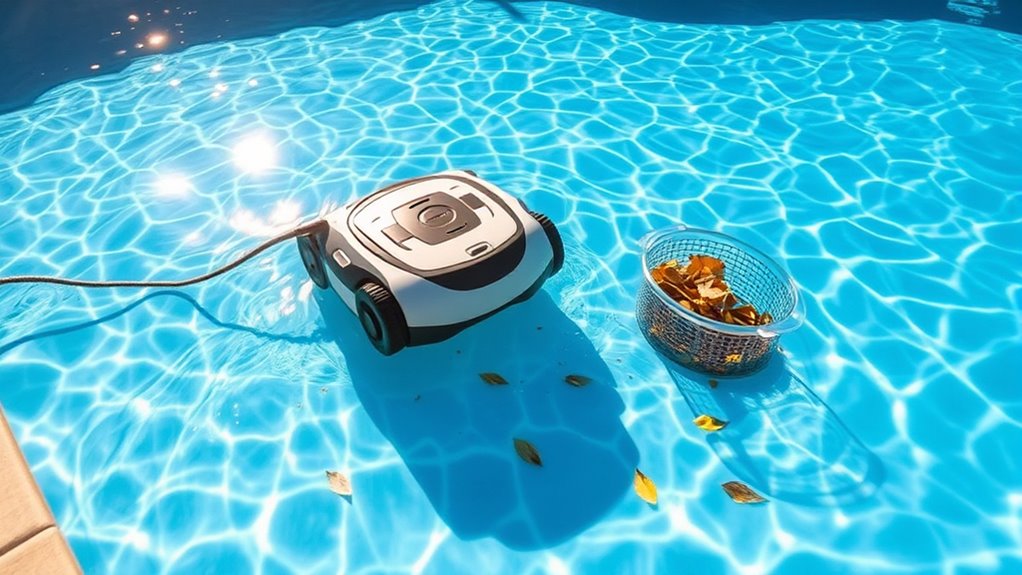
Regularly monitoring your pool’s debris levels helps you determine when your cleaner needs to run, preventing dirt and leaves from accumulating and impacting water quality. Keep an eye on visible debris—like leaves, insects, and dirt—especially after storms or heavy usage. A clean pool maintains proper pool chemical balance and reduces algae risk. Use the table below to gauge debris buildup and cleaning needs:
| Debris Level | Action | Frequency |
|---|---|---|
| Light debris | Skim surface, run cleaner if needed | Weekly or as debris appears |
| Moderate debris | Run cleaner, check chemical levels | 2-3 times a week |
| Heavy debris | Clean thoroughly, adjust chemical balance | As needed, especially after storms |
Additionally, maintaining proper chemical balance can help prevent algae growth and keep your pool water clear. Regular pool maintenance routines, including monitoring debris levels, are essential for optimal water quality and equipment performance. Incorporating routine inspections can help catch issues early and extend the lifespan of your pool equipment. To optimize cleaning efficiency, consider using a self-watering planters setup that minimizes manual effort and ensures consistent debris removal.
Tips for Efficient Cleaning Routine
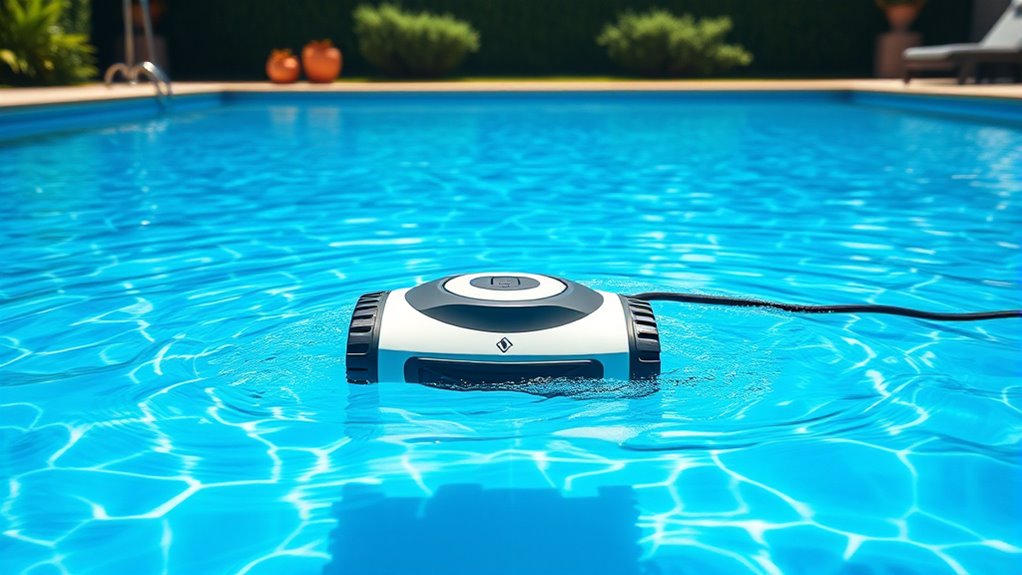
Establishing an efficient cleaning routine means planning ahead and staying organized. Using automatic scheduling can help guarantee your suction pool cleaner runs regularly without manual intervention, keeping debris accumulation in check. To maximize efficiency, consider these tips:
- Set your cleaner to operate during off-peak hours, reducing interference and energy costs.
- Regularly clear the filter and debris chambers to prevent clogs that slow down cleaning.
- Adjust your cleaning frequency based on debris buildup, increasing runs during heavy use or after storms.
- Be aware of privacy policy details to understand how your data is managed during smart device operation. Additionally, staying informed about technological impacts can help you make better decisions regarding your pool maintenance tools.
- As automation and AI in Education continue to evolve, it’s important to consider how technological advancements might influence your overall approach to home maintenance and safety. Incorporating self-watering plant pots concepts can also inspire innovative ways to maintain your pool equipment more effectively.
Signs You Need to Run the Cleaner More Often
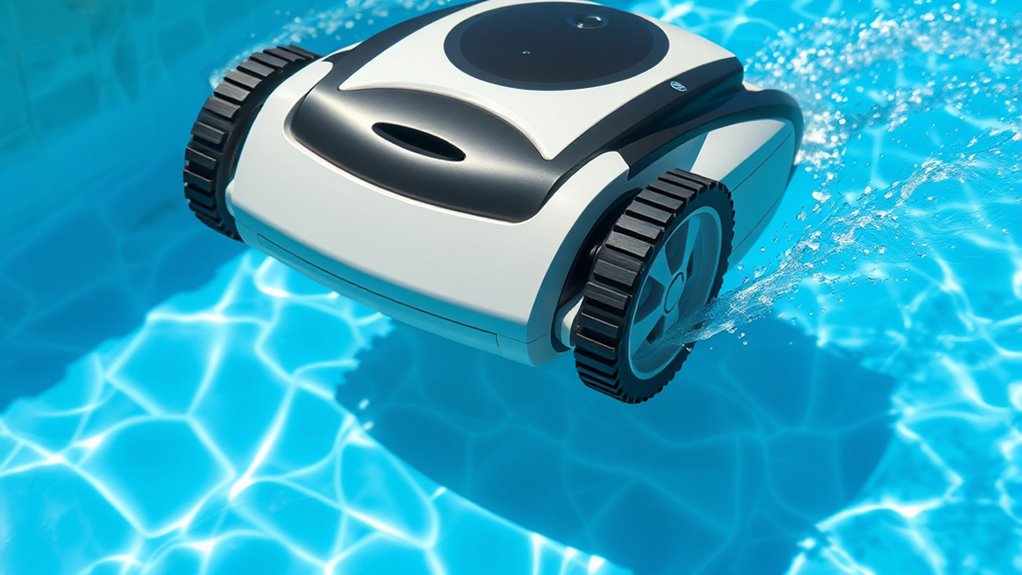
If you notice your pool quickly accumulating debris or the cleaner struggling to keep up with the dirt, it’s a clear sign you need to run the cleaner more often. Reduced robotic efficiency often results from debris buildup that hampers the cleaner’s ability to navigate and clean effectively. When debris accumulation becomes frequent, your pool may look dirty despite cleaning efforts. This indicates the cleaner isn’t covering the entire surface or working as efficiently as it should. Running the cleaner more frequently helps prevent debris from piling up, ensuring ideal performance. Paying attention to these signs keeps your pool cleaner functioning at its best, reducing overall maintenance and keeping your pool sparkling clean. Additionally, ensuring your suction pool cleaner is properly maintained and free of obstructions can improve its efficiency. Understanding how regular maintenance impacts the performance of your cleaner can help you schedule optimal cleaning routines. Regularly inspecting and cleaning the filter and brushes can also extend the life of your equipment and enhance cleaning effectiveness.
Frequently Asked Questions
Can I Run My Pool Cleaner More Than Once a Day?
Running your pool cleaner more than once a day isn’t usually necessary and could impact pool cleaner maintenance. It may also increase energy consumption considerations, raising your energy bills. Typically, running it once daily or every other day keeps your pool clean without overworking the equipment. If your pool gets heavy use or debris, consult your manufacturer’s guidelines or a professional to determine the best cleaning schedule for ideal performance.
How Does Water Temperature Affect Cleaning Frequency?
Did you know that warmer water speeds up algae growth by up to 70%? Water temperature directly impacts your cleaning schedule. When it’s warmer, algae and debris accumulate faster, so you might need to run your suction pool cleaner more frequently to maintain water clarity. Conversely, cooler water slows down growth, allowing for less frequent cleanings. Adjust your routine based on temperature to keep your pool sparkling and algae-free.
Should I Run the Cleaner During Pool Parties?
During pool parties, it’s best to run your suction pool cleaner beforehand to maintain ideal water quality. You don’t need to run it during the event unless there’s a significant mess or debris. After the party, update your pool maintenance and cleaning schedule to include extra cleaning if needed. Regularly running your cleaner ensures your pool stays inviting and safe, especially during busy times when debris and spills are more likely.
Does Using Chemicals Impact How Often I Should Clean?
Using chemicals can affect how often you should run your suction pool cleaner. If your chemical balance isn’t right, algae prevention becomes harder, and debris can accumulate faster. You should regularly check and adjust your chemicals to keep the water balanced, which reduces the cleaning frequency needed. When the chemical levels are proper, your pool stays cleaner longer, and your suction cleaner can work more efficiently, saving you time and effort.
Can Heavy Rain Change My Cleaning Schedule?
Heavy rain can definitely influence your cleaning schedule. It often causes debris accumulation in your pool, making it necessary to run your suction pool cleaner more frequently. Rain impact increases dirt and leaves in the water, so you might need to clean your pool after each heavy storm to keep it clear. Regular checks and adjustments ensure your pool stays clean, even during unpredictable weather.
Conclusion
Ultimately, finding the right cleaning schedule is like tuning a fine instrument—you want everything to harmonize perfectly. Keep an eye on debris levels, and don’t hesitate to run your suction pool cleaner more often when your pool faces heavy use or weather changes. By staying attentive and adjusting as needed, you’ll keep your pool sparkling like a mirror, inviting you to plunge in whenever you like. Consistent care makes all the difference in maintaining a pristine, inviting oasis.
